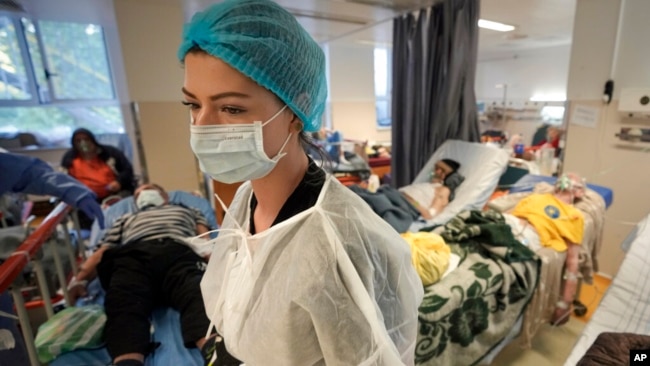ヨーロッパは、クリスマスに向け緩和されていると思っていました。
日本も忘年会シーズン、どうなるのでしょうか?
第6波に備えよ!との話ですし。前々回にもあったオミクロン新種の懸念もありますし、来年も安泰とはなりそうにありませんね。
早速、Here we go!!
- 国連事務局、欧州全域でCOVID-19による死亡者が増加していると警告 (和訳)
- United Nations Office Warns of More COVID-19 Deaths Across Europe
国連事務局、欧州全域でCOVID-19による死亡者が増加していると警告 (和訳)
United Nations Office Warns of More COVID-19 Deaths Across Europe
世界保健機関(WHO)欧州事務所では、53カ国の地域で、来年春までに新型コロナウイルスによる死亡者数が70万人に達すると予測しています。
WHOヨーロッパ事務所はデンマークに拠点を置いています。同事務局は、ワクチンによる感染症や重篤な疾患からの保護が不十分であるという証拠が増えていることを指摘しています。重篤な健康問題を抱える人、60歳以上の人、医療機関で働く人には、できるだけ早く追加の”ブースター用量”を投与すべきだとしています。
しかし、スイスにあるWHOの国際本部は、これとは異なる見解を示しています。WHOは、2021年末までブースターの使用を延期することを繰り返し求めています。その理由は、開発途上国がより多くのワクチンを入手できるようにするためです。発展途上国や貧困国は、豊かな国に比べてCOVID-19ワクチンの深刻な不足に直面しています。
WHOヨーロッパは、ウイルスの蔓延を防ぐために、ワクチンの接種、推奨される洗浄方法の遵守、社会的距離の取り方などを呼びかけています。
ハンス・クルーゲ博士は、WHOヨーロッパの地域ディレクターです。「現在、ヨーロッパと中央アジアにおけるCOVID-19の状況は非常に深刻です。これから厳しい冬を迎えますが、希望を失ってはいけません。なぜなら、私たち全員が、パンデミックを安定させるために断固たる行動を取ることができるからです。」
WHOヨーロッパが管轄するヨーロッパ地域は、中央アジアの奥深くまで広がっています。WHOヨーロッパによると、この地域でのCOVID-19による死亡者数は、ここ数週間で1日あたり約4,200人に上っています。これは、9月末に記録された1日あたりの死亡者数の2倍にあたります。
この地域での総死亡者数は現在150万人に達しています。
WHOヨーロッパは、同地域で死亡者や患者が増加している理由として、3つの主な理由を挙げています。1つは、ウイルスのデルタ株(バージョン)が継続的に広がっていること。もう1つは、マスクの着用や物理的に距離を置くことなどの制限措置が緩和されていること。3つ目の理由は、ヨーロッパではまだ多くの人がワクチンを接種していないことです。
WHOヨーロッパの声明では、現在から2022年3月1日までの間に、「25カ国で病院のベッドに高いまたは極端なストレスがかかり、53カ国のうち49カ国で集中治療室(ICU)に高いまたは極端なストレスがかかることが予想される」としています。
また、来年3月までにパンデミックによる死亡者数が200万人に達する可能性があるとしています。
United Nations Office Warns of More COVID-19 Deaths Across Europe
The World Health Organization’s Europe office estimates its 53-country area could record 700,000 additional deaths from the new coronavirus by next spring.
WHO Europe is based in Denmark. The office noted the growing evidence that people are less protected against infection and less serious disease through vaccines. It said an additional “booster dose” should be given as soon as possible to people with serious health problems, people over 60 and those who work in health care.
The WHO's international headquarters in Switzerland, however, has advised differently. It has repeatedly called for a delay on the use of boosters through the end of 2021. It has called for the delay so that more doses can be made available to developing countries. Developing and poor countries have faced a severe lack of the COVID-19 vaccines compared to rich countries.
WHO Europe called on people to get vaccinated, respect recommended washing methods and practice social distancing to help stop the spread of the virus.
Dr. Hans Kluge is regional director for WHO Europe. He said in a statement, “Today, the COVID-19 situation across Europe and Central Asia is very serious. We face a challenging winter ahead, but we should not be without hope, because all of us…can take decisive action to stabilize the pandemic.”
The European region the office oversees stretches deep into central Asia. WHO Europe said deaths from COVID-19 in the region rose to nearly 4,200 per day in recent weeks. That is two times higher than daily deaths recorded at the end of September.
Total deaths have now reached 1.5 million in the region.
WHO Europe said there are three main reasons for the rise in deaths and cases in its region. One is the continued spread of the Delta variant, or version, of the virus. Another is an easing of restrictive measures like requirements for mask-wearing and physical distancing in places. The third reason is that a high number of Europeans remain unvaccinated.
The WHO Europe statement said, “We can expect that there will be high or extreme stress on hospital beds in 25 countries, and high or extreme stress in intensive care units (ICUs) in 49 out of 53 countries” between now and March 1, 2022.
It also said the area could reach a total of 2 million deaths from the pandemic by next March.
Words in This Story
booster (shot) –n. an extra amount of a substance (called a vaccine) that is injected with a needle into a person or animal to help protect against a disease
dose – n. the amount of a medicine, drug or vitamin that is taken at one time
practice –v. to do (something) regularly or all the time as an ordinary part of your life
challenging –adj. difficult in a way that is sometimes interesting or enjoyable
stabilize –v. to stop quickly changing, increasing or getting worse
stress –n. pressure caused by physical force or by facts that influence how people do things
